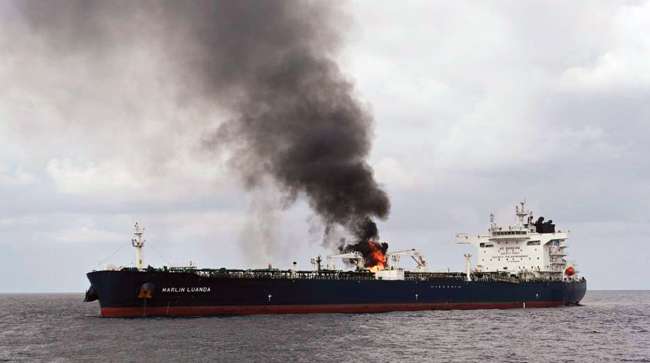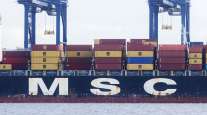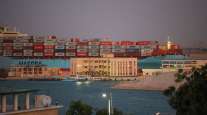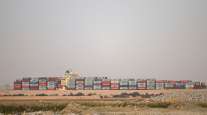Senior Reporter
FMC: Sanctions Against Yemen Should Be Considered

[Stay on top of transportation news: Get TTNews in your inbox.]
Federal Maritime Commissioner Carl Bentzel says his office wants the U.S. government to investigate whether economic sanctions are warranted against Yemen as for its role in the Houthi rebels’ attacks against containerships and other vessels.
Since November, the Houthis have repeatedly targeted ships in the Red Sea over Israel’s offensive in Gaza. They have frequently attacked vessels with tenuous or no apparent links to Israel, imperiling shipping in a vital route for trade among Asia, the Middle East and Europe.
“I’m relatively pessimistic unless you can get a stronger international coalition concerning the Red Sea and the Suez Canal,” Bentzel told Transport Topics. “I think every nation needs to step up to the plate and acknowledge that this impacts all of us, you and me, and it costs and impacts the ability to manufacture and produce, and the Houthis are generating money and getting stronger because of these missile attacks.”
The five-member FMC held an advisory hearing on the status of world shipping Feb. 7 and concluded that shippers and businesses are facing a modern-day version of the “Barbary pirates” because of the violence.

Bentzel
FMC Chairman and former congressman Daniel Maffei said he is concerned that once-in-a-lifetime “Black Swan” events, such as the attacks and the COVID-19 pandemic, are becoming more frequent. In effect, they are forcing transportation and retail leaders to find new, more creative ways to move cargo at a fair price.
Bentzel said there are laws that would allow the U.S. to implement sanctions against Yemen’s government, but that he is not ready yet for the government to take that action.
“I can’t believe we are talking about piracy today, yet we are,” Bentzel said. “It’s a problem area. It’s a problem issue, and it periodically creates major issues. This is the worst I have ever seen, going back to 1805 and 1806 when the Barbary pirates attacked ships.
Recording of FMC Hearing on Red Sea Available https://t.co/48AwmNVR3q — FMC (@FMC_gov) February 9, 2024
“We have two laws for shipping, and these statutes empower the FMC to investigate conditions that create unfavorable conditions for shipping concerning foreign commerce. I am looking at ways that could trigger sanctions, but there are some challenges because we have a high level of political instability in that region.”
Saudi Arabia recently said it would send another $250 million in aid to the internationally recognized government in Yemen, which the Persian Gulf kingdom is backing in the government’s fight against the Iran-backed, Yemen-based Houthis. Last August, the Saudis pledged $1.2 billion to Yemen to help keep the government running, and this payment was the second one Riyadh has made.
Bentzel pointed out that ocean carriers move more than 90% of the country’s international trade, and rerouting some of the ships out of the Red Sea and far south around the Horn of Africa significantly increases costs and adds days to the journey.
“The new Ocean Shipping Reform Act gives us the authority to look at these charges, and there are reports of tripling prices on the spot market, and there are some additional costs,” Bentzel said.
While the piracy is disrupting shipping lanes and again causing the rerouting of vessels, Bentzel said the supply chain is much more fluid than it was four years ago when the pandemic hit. Now, in reaction to the violence in the Red Sea, shippers are adjusting and moving some cargo back to West Coast ports, which saw a significant volume decline last year because of labor concerns and a slowing of China’s economy.
How does hydrogen fuel cell technology fit into freight transportation? Find out with Parker Meeks, the CEO of Hyzon, a company that designs and manufactures fuel cell technology for heavy-duty transport applications. Tune in above or by going to RoadSigns.ttnews.com.
“We are seeing very nice cargo flows going through the West Coast ports, partly because of the Chinese New Year when shippers put a lot of cargo out there … in anticipation of the two, three weeks of vacations in Asia,” Bentzel said. “We haven’t seen the full impact of the changes through the Suez Canal and the restrictions on the Panama Canal.”
FMC also is concerned about the drought at the Panama Canal, which has reduced the number of ships passing through the freshwater way from 36 a day to 24.
As a result of low water levels, transportation and logistics firm McKinsey & Co. estimates that this year, as many as 4,000 ships may be diverted through the Strait of Magellan in southern Chile at the tip of South America, adding at least 25 days of transit time.
“I think the freedom of navigation and the freedom of the seas is essential,” Bentzel said. “But there will be some issues, some challenges moving this cargo. This is clearly the biggest challenge to shipping since COVID. These two changes to the trading patterns are game changers.”
Want more news? Listen to today's daily briefing below or go here for more info:





